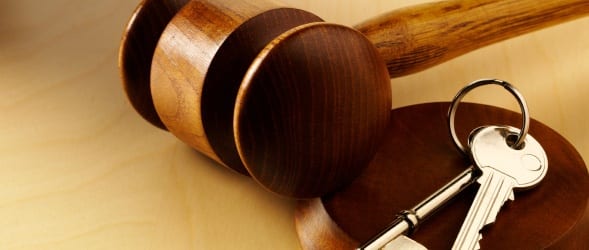The traditional channels of searching real estate listings and working with real estate agents are no more the only ways to acquire a property. Experienced real estate investors often rely on buying a property at auction. But auctions aren’t limited to professionals, and even first-timers purchase their homes at auctions.
How properties are listed in auction catalogues?
Foreclosure auctions and tax lien auctions are the two main types of property auctions, and there are several steps involved before a property reaches auction.
First, the homeowner doesn’t pay his mortgage for several months. Then, the bank files a notice of default with the county recorder. If the homeowner doesn’t pay the balance or renegotiate the loan with the lender, the home is eligible for auction. The period between the time homeowner stops paying the mortgage and the home is put up for auction depends, and can be a few months to a year or more.
The other main way a home ends up at auction is when the owner doesn’t pay property taxes or becomes defaulter on state or local income taxes. In these cases the unpaid tax authority, and not the bank, seizes the property.
Way Property Auctions Work
Auctions take place at local government courthouses and other locations as per the auction companies, which may include hotel conference rooms or online in case of homes. Foreclosure auctions are held by trustees hired by bank. Tax lien auctions are conducted by local sheriffs.
Property auctions are of two types. In a subject to lender confirmation auction, the lender doesn’t have to accept your offer even if you are the highest bidder whereas in an absolute auction, the winning bid gets the property.
The starting price of the auction may be the balance remaining on the mortgage, or lower to spur bidding. In the case of a foreclosure auction, the lender is not allowed to profit from the auction and these properties are often sold at a loss, but in case of profit, it is supposed to go the homeowner after the payment of mortgage and any other liens.
Things potential auction properties bidders can learn before bidding
Some auction companies have open houses and potential bidders can walk through the properties (may be with a camcorder) beforehand to have a better understanding of the property before the actual bidding process takes place.
Listings describing the properties to be auctioned are also available which the potential bidders can know in advance the exact property they will be bidding and at allot a budget. At other times people can only drive by and see the outside. To discover properties set for auction, potential buyers can check county recorder websites and foreclosure listing services.
For making the payment, bidders should come prepared with a cashier’s check for the amount of money required by the auction holder. Winning bidders will pay any auction fees and/or bidding fees and put down an earnest money deposit on the property when the deal is finalised.
The winners then go through escrow and closing just like with any other purchase. Bidders at property auctions are often real estate investors who can afford cash, but for auctions that allow financing, it is best to get prequalified ahead of time. Some auction houses prefer that you work with their affiliated lenders who will be there at the auction.
Benefits
There are a number of advantages of buying a property at auction. Auctions offer a first chance to snap up certain properties, so some of the best properties get purchased at auctions. Moreover, because of the extra risk involved and as lesser number of people may be interested in the property compared to those available through traditional channels, prices can be lower.
Drawbacks
Properties being auctioned off aren’t necessarily great. If a property ends up at auction, it means the owner was having financial trouble, so the house may have maintenance problems or might even be completely trashed. Also, because of the financial situation of the previous owner, there may be other liens against the home, like tax liens, contractor liens, or a second mortgage. Bidders can avoid this problem by working with an auction house to ensure that the property has clear titles.
Buying a property at auction often involves a lot of cash. Each auction company/county government has its own requirements for payment. You will need some cash to secure your bid. Down payment amounts and methods of purchasing often depend on the property and the auction house.
Even if you win the auction, in some cases, you will not be allowed to purchase the property. The bank doesn’t have to accept the winning bid in subject to lender confirmation foreclosure auction. Similarly, the auction could have a hidden reserve price as the minimum acceptable price. So, it is important that you familiarize yourself with the auction terms ahead of time to avoid any unpleasant surprises.
Sometimes auction properties do not allow for a home inspection or even provide inside view prior to the auction. If you can’t afford the risk of buying a property in poor condition, it is advisable to avoid such auctions and stick with auctions that allow you inspection of the property before bidding. This is important because otherwise, you will not know what you’re getting into, the repair costs involved or the true value of property until you’ve become the new owner.


